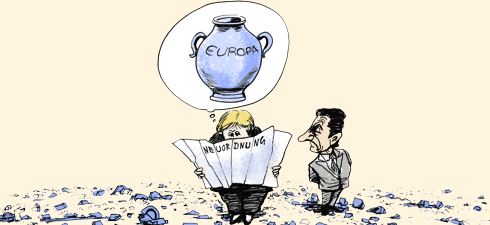In a week that is set to end with the 9 December European summit, the Franco-German relationship will once again be the key to a possible exit to the crisis. But with this in mind, we should acknowledge and correct one mistake, and avoid another that derives from an error of perspective.
The mistake, a major one, is that of all the Germanophobic voices heard before the weekend. “Europe under a jackboot,” (Marine Le Pen - president of the far-right Front National) “Mrs Merkel’s Bismarckian politics,”(Arnaud Montebourg - Socialist MP who was ranked third in the Socialist party primaries]; Nicolas Sarkozy is “Daladier in Munich” (Jean-Marie Le Guen - Socialist MP] implicitly implying a comparison between the Chancellor and Hitler; “Surrender” (Martine Aubry - First Secretary of the Socialist Party]. These words run the risk of “reviving old demons” to cite the title of the excellent recent work by economist Jean-Pisani Ferry.
A refusal to resort to scapegoating tactics that are an insult to history does not mean that we cannot criticise our major partner: in a time of recession, its sluggish response to two years of developments in the Eurozone crisis, and its insistence on a focus that is restricted to budgetary issues are certainly not beyond reproach.
But words chosen are never innocent and the remark made by François Hollande [Socialist candidate for the 2012 French presidential election] in yesterday’s Journal du dimanche (“Let’s avoid hurtful language”) falls well short of what should be said.
All roads lead to Frankfurt
In passing, we should also point out that the strength of Berlin is the weakness of a France whose credibility in terms of its public finances has long been in doubt and remains so today. Lastly, we ought to note, and this time with a smile, that the French do want Europe, just as long as it is French!
The error of perspective concerns the means by which the current crisis is to be resolved. Discussions between France and Germany on the automatic nature of sanctions against countries that behave like the spendthrift grasshopper in La Fontaine’s fable, and on the reform of treaties (how, when, and with whom - 27 states or 17?) as well as the role of the European Court of Justice, may well be real issues as to the nature of the Union. But the reality is that if a deal is struck on these matters only, then it will not be enough.
Ultimately, the solution to the mistrust that persists on financial markets (capital flight, the fact that companies can borrow for less than the state) remains in the hands of the European Central Bank, which is now the only institution with the power to reassure the eurozone. The recent sigh of relief over interest rates (the spread between French and German bonds has declined from 220 to 100 points in ten days) has been prompted by the more open approach adopted by the new ECB President Mario Draghi. All roads lead to Frankfurt.
Translated from the French by Mark McGovern
Merkel-Sarkozy
The head, the legs and the banker
The display of entente between the German Chancellor and the French President is worked out right down to the smallest details. She is dressed in black with a silver necklace, while he is also in black with a blue tie. She affirms that this is the "worst crisis since the creation of the euro," and he talks about “what is probably the biggest challenge that the European Union has ever faced in the course of its existence.”
But that is where the entente stops, explains Der Spiegel: the bones of contention remain the same, namely the functioning of the European Financial Stability Facility (EFSF), the role of the ECB, and the involvement of private creditors in possible state bankruptcies. For the Hamburg weekly, there is room to negotiate a compromise:
If European institutions could prevent governments from living beyond their means, there is no further reason why European states should not benefit from shared responsibility in the event of emergencies.
But for the moment-
Angela Merkel and Nicolas Sarkozy remain prisoners of the political traditions of their respective countries. The French do not want to accept the independence of the European Central Bank. The Germans want to be able to benefit from the single market, but without assuming financial responsibility.
Mistrust continues to reign to the point where Der Spiegel reports that Jean-Claude Juncker, the Prime Minister of Luxembourg and the leader of Eurogroup, can expect a cross examination from the Elysée if he calls the Bundeskanzleramt, and vice-versa. By way of illustration, an anecdote: "Behind the scenes at a European summit, Sarkozy says to the chancellor, “Angela, together we are the head and the legs of Europe.” To which Merkel replies, “ No, you are the head and the legs — I am the bank."
Was this article useful? If so we are delighted!
It is freely available because we believe that the right to free and independent information is essential for democracy. But this right is not guaranteed forever, and independence comes at a cost. We need your support in order to continue publishing independent, multilingual news for all Europeans.
Discover our subscription offers and their exclusive benefits and become a member of our community now!












